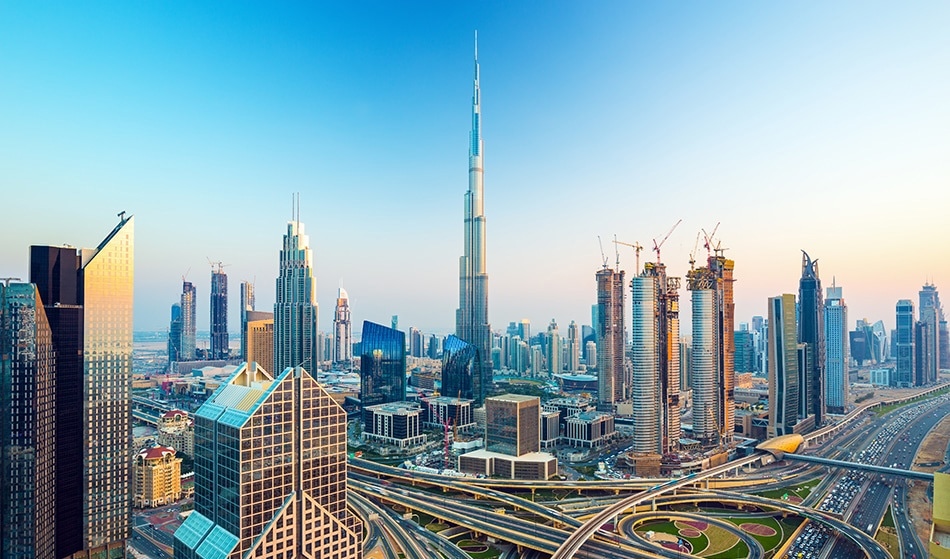Jun 4 2015

Image Credits: Rastislav Sedlak SK/shutterstock.com
The United Arab Emirates is located between Saudi Arabia and Oman in the Middle East. The total area of the country is 83,600 km2 and it had a population of 9,68m in 2019.
The UAE has an open economy with the country's Free Trade Zones offering 100% foreign ownership and zero taxes, which helps in attracting foreign investors. Petroleum and natural gas exports are the country's major export earners. The GDP of the nation was $432.6 billion in 2018.
The UAE has an economic climate that is favorable to entrepreneurs, with low barriers to trade, regulations that are conducive to open market policies and a high degree of political stability.
Nanotechnology Companies
The major nanotechnology company in the United Arab Emirates is ARA Emirates - a German-UAE joint venture, specializing in nano coatings. Their process can coat surfaces with pure gold to give it an outstanding brilliance.
Nanotechnology Education and Research
The UAE has a number of universities that offer research and educational opportunities in nanotechnology, which are listed below:
- Khalifa University of Science, Technology and Research is an independent, non-profit, coeducational institution inaugurated in 2007 as part of an Abu Dhabi Government initiative. They provide the following nano-opportunities. The Nanotechnology Centre at the university plays a leading role in the establishment of nanotechnology research, development, and industry in Abu Dhabi and the UAE. The center is dedicated to research on theoretical and experimental nanotechnology with a strong emphasis on education and training.
- The Khalifa Semiconductor Research Center is a multidisciplinary team-based research platform. Charged with investigating and supporting research on a variety of novel materials/structures/processes. The organization provides findings to Khalifa University and other R&D centers for further development.
- Ras Al Khaimah Center for Advanced Materials (RAK CAM) was founded in late 2007. The mission of RAK CAM is to advance, explore and exploit the forefront of the science and engineering of Advanced Materials. Their aim is to become a flagship for advanced research in the Middle East and to become one of the leading centers in the design, synthesis, tailored properties, and applications of Advanced Materials.
- Masdar Institute of Science and Technology is a world-class research-driven graduate-level university. The Institute was created in collaboration with the Massachusetts Institute of Technology (MIT), USA. It plays host to numerous Labs & Research Groups. The following are some of the nano-based groups:
- Laboratory of Energy and Nano Science (LENS)
- Nanofabrication Lab (300 m2 Cleanroom Facility)
- Nano-Optics and Optoelectronics Research (NOOR) Laboratory
- NanoFluids Lab (NFL)
- United Arab Emirates University – The first and foremost comprehensive National University in the United Arab Emirates.
- eFORS office is the University consultancy office within the College of Engineering that deals with several science and technology issues including Biochemical and Biopharmaceutical Processes and Bioengineering and Nanotechnology. They offer an MSc. in Material Science and Engineering. The master’s program focuses on all materials, metals, polymers, ceramics, electronic materials, nanomaterials, biomaterials and their composites.
Recent Developments
Reports released during October 2012 revealed that the world’s second largest foundry, GLOBALFOUNDRIES has agreed to partner with Masdar Institute to develop Abu Dhabi as a center for semiconductor R&D and manufacturing excellence. The company allowed students and professors to use its technology facilities at its Abu Dhabi branch. The facilities have a laboratory-like environment with powerful production servers, engineering work stations and a high-speed data network that can be used for enabling remote access to very advanced nanotechnology engineering systems. It also provides wide access to process design kits (PDKs) for advanced semiconductor technology nodes, including the latest High-K Metal Gate (HKMG) transistor technology.
In November 2012 it was reported that several industries across the UAE are interested in utilizing the FEI Quanta™ 3D DualBeam™ microscope installed at the Masdar Institute of Science and Technology. This microscope will greatly benefit various nanotechnology sectors including the semiconductor industry, oil and gas industry and enable researchers to characterize and analyze new materials.
Masdar Institute of Science and Technology was all set to install the region’s first cleanroom lab by the end of 2012. To be able to use the lab at the optimal level, three faculty members and four students from the Institute took part in the Second International Workshop on ‘Cleanroom Training for Critical and Sustainable Technologies’ program that was held from 25th June to 8th July 2012 in Ankara, Turkey.
The fifth annual International Workshop on Advanced Materials (IWAM 2013) took place in 2013 at Ras Al Khaimah. The workshop focused on new developments in the field of materials science including energy, health and environmental applications. IWAM is conducted every year, and at each event a few graduate students are provided with the opportunity to present their work during poster sessions.
A Ph.D. student from Masdar Institute has developed an integrated device that can turn any smartphone into a powerful multipurpose tool that can assist scientists and engineers involved in nanotechnology and nanoscience.
Other researchers have fabricated the first bulk-hetero-junction (BHJ) solar cell in the United Arab Emirates. These polymer based organic photovoltaics can be printed onto flexible substrates in a range of colors providing new levels of versatility in their design, which makes these solar cells suited to BIPV applications.
The UAE, like many other Arab nations, recognizes that they must invest more money into R&D to stimulate innovation, which in turn aids economic growth, according to the Advanced Technology Investment Company (ATIC). As of January 2013, the UAE had invested over Dh100 million since 2009 and resulted in improved investment into UAE universities.
The UAE spends only a fraction of GDP on R&D, but this is expected in the future, further reinforcing an already strong advanced technology ecosystem. This will help stimulate nanotechnology research, in particular semiconductors which is a focal area in UAE's strategy for moving forward.
Sources and Further Reading
This article was updated on the 3rd September, 2019.